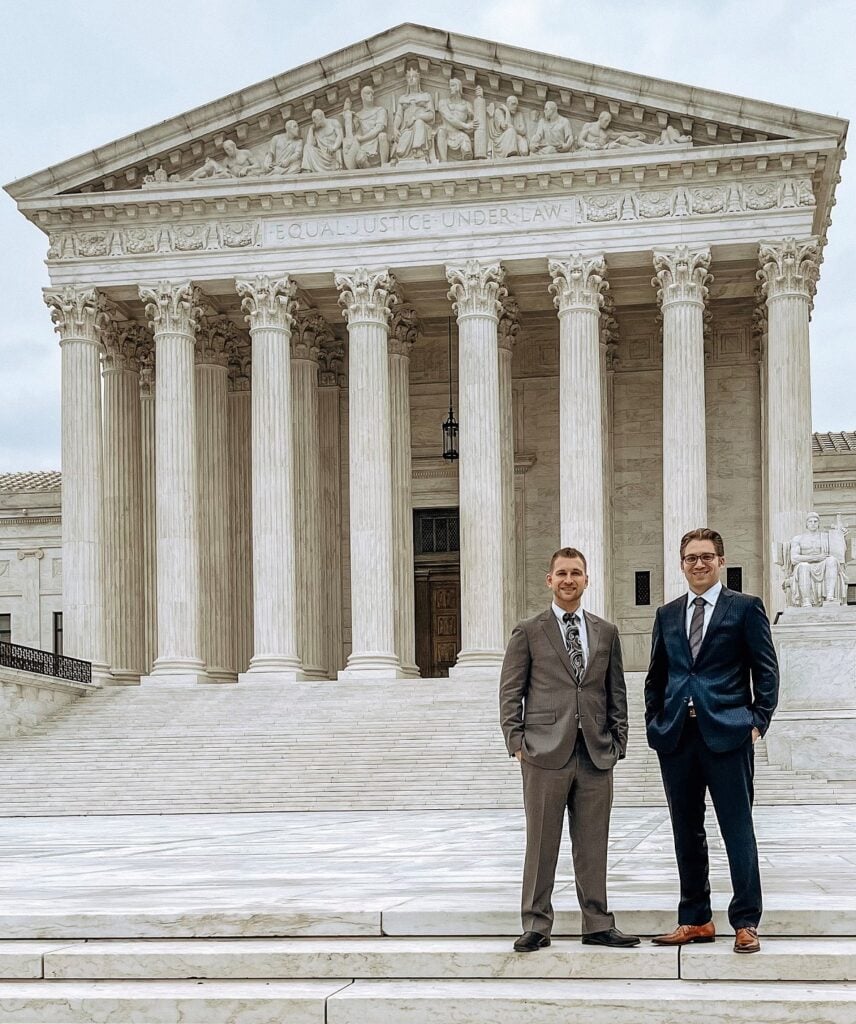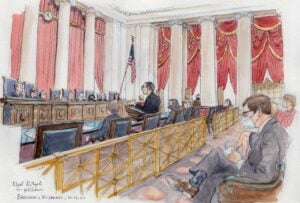Bahrie Law, PLLC, Argues Before The US Supreme Court
Bahrie Law, PLLC took a veteran’s Social Security Disability case to the US Supreme Court on October 13, 2021.
Bahrie Law, PLLC represented David Babcock.
Mr. Babcock first came to Bahrie Law, PLLC for a consultation, and we agreed with him that the U.S. Eighth Circuit Court’s decision in Peterson was correct and the Uniformed Services Exception should apply to National Guard Dual Status Military Technicians.
We agreed to take his case on a contingency fee basis, first appealing Social Security’s decision for a hearing before an Administrative Law Judge.
About The Attorneys

Bahrie Law, PLLC handles Social Security Disability cases on behalf of disabled workers throughout the state of Michigan.
- Attorney Justin M. Bahrie has helped disabled workers recover millions of dollars in compensation.
- Attorney Nicholas A. Kipa primary area of legal practice is in Social Security Disability law, as well as workers’ compensation and personal injury.
The attorneys received a white quill pen for being at counsel, a longstanding US Supreme Court tradition.
Babcock v. Kijakazi

Babcock v. Kijakazi is based on retirement benefits under the Social Security Act for a retired military technician, David Babcock. Babcock had served in dual roles: a full-time civil service technician, for which he received civil-service pay and pension, and part-time National Guard service, for which he received military pay and pension.
Upon retirement, Babcock applied for Social Security benefits, which were granted but reduced under a “windfall elimination provision” due to his civil-service pension. Babcock contested this, arguing that his pension fell under a statutory exception for uniformed services. After exhausting all agency reviews and filing a lawsuit in federal court, both the District Court and the Sixth Circuit upheld the agency’s decision.
The Supreme Court held that civil-service pension payments for dual-status military technicians do not fall under “service as a member of a uniformed service” according to 42 U. S. C. §415(a)(7)(A)(III).
The Decision
The case was argued on October 13, 2021, and decided on January 13, 2022.
The Court, with an 8-1 majority, ruled that pension payments for ‘dual-status military technicians’ – federal civilian employees assisting the National Guard, are not considered as ‘payments based entirely on service as a member of a uniformed service’.
Opinion of the Court written by Justice Amy Coney Barrett: “…That distinction holds true even though Babcock also served at other times in a different capacity as a member of the National Guard. His civil-service pension payments are not based on that service, for which he received separate military pension payments that do not trigger the windfall elimination provision. Nor are we moved by Babcock’s argument that the statutory requirement for technicians to maintain National Guard membership makes all of the work that they do count as Guard service. A condition of employment is not the same as the capacity in which one serves. If a private employer hired only moonlighting police officers to be security guards, one would not call that employment “service as a police officer.” So too here: the fact that the Government hires only National Guardsmen to be technicians does not erase the distinction between the two jobs.”
Dissent by Justice Neil Gorsuch: “…I appreciate the analogy to police officers moonlighting as private security guards. But to my mind dual-status technicians are more like part-time police officers employed in their outside hours by the same police department to train recruits, administer the precinct office, and repair squad cars—all on the condition that they wear their police uniforms and maintain their status as officers. I suspect most reasonable officers in that situation would consider the totality of their work to constitute “service as . . . member[s]” of the police force. So too here I expect most Guardsmen who serve as “dual-status technicians”—who come to work every day for the Guard, in a Guard uniform, and subject to Guard discipline—would consider all of their work to represent “service as . . . member[s]” of the National Guard. I would honor that reasonable understanding and would not curtail servicemembers’ Social Security benefits based primarily on implications extracted from other, separate “bookkeeping” statutes.”
In Summary

Ultimately, the Supreme Court’s decision rested on their interpretation of what the word “as” meant within the context of the statute
The U.S. Solicitor General for Defendant argued that “service as a member of a uniformed service” created a distinction between service that dual-status technicians perform “in [their] capacity” as members of the National Guard and other aspects of the job that they perform in a “civilian” capacity. (Reading “as” to mean “[i]n the role, capacity, or function of”)
On Plaintiff’s side we argued that this substantially overreads the definition and meaning of the word “as” within the statute. Even using the Defendant’s definition though, ruling should still have favored the Plaintiff.
In The News
Justices debate Social Security benefits for National Guard workers: SCOTUSBlog
Justices to consider Social Security benefits for National Guard workers: SCOTUSBlog
Justices will assess federal labor protections for National Guard technicians: SCOTUSBlog
